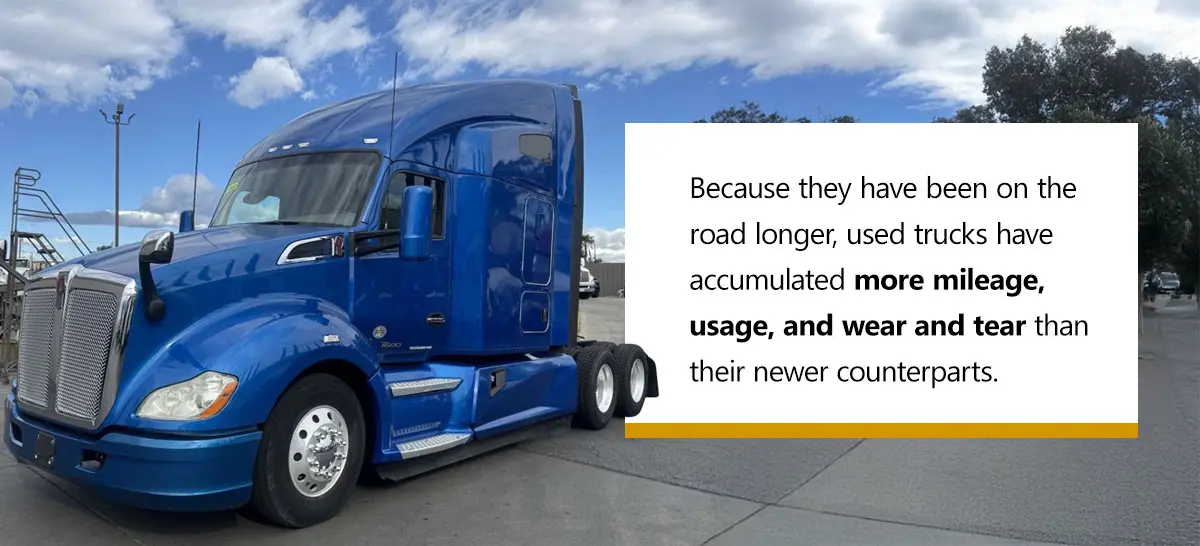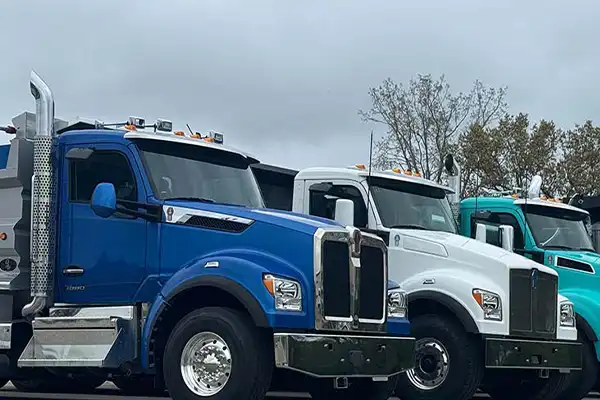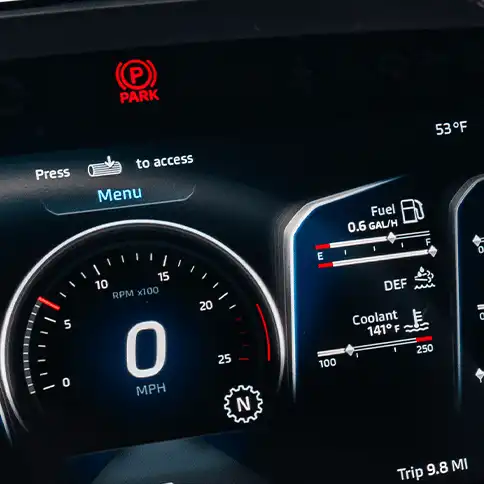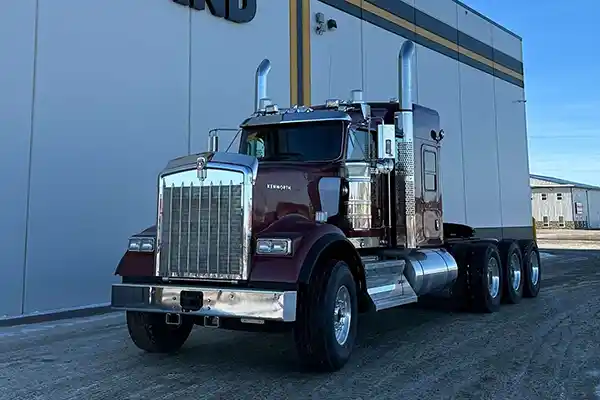It’s no secret that truck drivers are the backbone of our economy. Without these unsung heroes, businesses couldn’t deliver or receive the products necessary to run their operations. Recent estimates suggest each semi-truck travels over 80,000 miles per year to transport essential goods and materials, including:
- Heavy equipment
- Construction materials
- Fresh food and beverages
- Hazardous materials and chemicals
Because they fulfill such critical roles, semi-trucks and trailers are nothing short of an asset for businesses. Truckers depend on reliable vehicles for shipping and carrying products across the country. Your fleet will require durable, well-maintained vehicles to transport items efficiently and stay on schedule.
As an owner-operator, you face a pivotal decision when purchasing a commercial semi-truck: whether to buy a new or used model. This guide will explore the pros and cons of both options, helping you determine which is best for your business.
What Are the Benefits of New Semi-Trucks?
New rigs and semi-trucks offer many benefits, such as reduced ownership costs and tax breaks. Below are some advantages of buying new versus used.
1. Full Knowledge of the Vehicle’s History
You’ll probably get a comprehensive report on a used truck’s operational history. However, there’s always a risk of dishonesty or inaccuracies. The previous owner might not fully disclose all exterior and mechanical defects. You may not know how well the past owner drove or maintained it. It’s always best to research a seller thoroughly and ensure they’re credible before buying from them.
Since there was no previous owner, you know what you’re getting with a new truck. With proper servicing and preventive maintenance, you will enjoy years of reliable performance.
2. Lower Operating Costs
Purchasing a new model decreases your operating costs in a few ways:
- More miles per gallon: It’s widely known that fuel is one of the most significant expenses of semi-truck ownership. On average, fuel costs $0.553 per mile. Compared to older models, newer semi-trucks often have higher miles per gallon and better fuel economy. You can save considerably on fuel by opting for a newer rig.
- Extensive warranty coverage: Many of the latest semis include warranty coverage for multiple issues and damage. This coverage helps you save on repairs and servicing.
- Cheaper maintenance: A new truck will likely have fewer repair and servicing requirements due to lower mileage and use than a used model. Plus, a warranty usually covers much of the maintenance-related costs.
3. Tax Deductions on Depreciation
You can typically deduct new and used commercial vehicle expenses on your taxes. However, newer trucks have a higher initial value than used trucks, yielding considerable depreciation benefits. You can deduct your new semi-truck’s depreciation on your taxes in the first three years.
Say you purchase a new truck for $120,000. You could see a $40,000 depreciation expense deduction per year. This expense would decrease your taxable income by $40,000. Leveraging these deductions provides substantial business savings come tax season. Many other work vehicle expenses, such as repairs and routine maintenance, are tax-deductible.
If you play your cards right, you may even be able to fully deduct the purchase price of your new truck. The IRS allows businesses to deduct business equipment costs, and new trucks fall under this umbrella.
4. Peace of Mind
Operating a truck that constantly malfunctions can be both expensive and stressful. Time is money, and constant repairs and delays put your operations behind schedule. You can have peace of mind when purchasing a new truck, as it reduces the risk of frequent repairs and downtime.
What Are the Disadvantages of Buying a New Semi-Truck?
While a new semi-truck has many benefits, it has potential stumbling blocks. Here are some prospective obstacles you could face when selecting a new model.
1. Higher Initial Cost
Since it has virtually zero miles and a clean service record, a new rig will inevitably cost a prettier penny upfront than a used model. Despite warranty coverage, low maintenance requirements, and other benefits, you can expect the cost of a new truck to burn a larger hole in your pocket.
Maybe you have limited capital or are just getting your business off the ground. You might not be in a position to take on lofty monthly payments. Purchasing a used model may make more financial sense in this case.
2. Depreciation
A new vehicle loses value the moment you drive it off the lot. It will rapidly depreciate within its first few years of service, affecting its future resale value.
New vehicles depreciate quickly for a few reasons:
- A truck legally switches from new to used as soon as it’s sold and titled.
- Many automotive manufacturers release new models each year. Chances are, you wouldn’t want to purchase a year-old model for a similar price as the current-year one.
Used trucks have already undergone the steepest depreciation curve, making them the more budget-friendly choice for their resale value.
3. Long-Term Commitment
Remember that a new truck or rig will be a longer-term investment than buying a used model, as the initial price is higher. If you take the plunge and purchase a new truck, prepare to be in it for the long haul.
Buying new may not be practical if you don’t plan to be on the road for a long duration. You could still juggle high monthly payments after changing jobs or leaving the industry.
4. Research Limitations
When looking at used trucks and older models, you’ll likely find more information to assist your research. These vehicles have been around longer, giving you more data to research. You can compare common issues and recall history when shopping for used trucks. This process helps you narrow your options and make the best decision for your fleet.
New trucks haven’t been on the road as long as used models. That means they haven’t been road-tested as much, running the risk of undiscovered faults and potential recalls. A recall could force you to look for another truck and start the purchasing process again, setting back your operations.
What Are the Benefits of Used Semi-Trucks?
Used semi-trucks and rigs offer multiple benefits, from more affordable price tags to potentially high resale value. Here are some perks of buying your rig used.
1. Lower Upfront Costs
Due to the depreciation in its first few years of operation, a used semi-truck costs much less upfront than a new rig. Plus, you can still find your desired features in a used model. The higher price tag of newer models can be unattainable for many fleet operators, especially those new to the industry.
A new rig runs anywhere from $100,000 to $200,000+. Used semi-truck prices start much lower, as little as $30,0000, and typically do not exceed about $150,000 depending on condition and year.
You can get your business off the ground or expand your fleet for a much lower price upfront than buying new. Chances are, there’s a used semi at your desired price point that can handle your material-carrying requirements.
Additionally, a low purchase price can be beneficial for your loaning process. Spending less upfront means you’ll have less to finance. You can experience dramatically lower loan rates, saving you money later. Whether you’re just starting as an owner-operator or have a tight budget, a used semi-truck can be cost-effective.
2. Resale Value Potential
Like any vehicle, a new semi-truck loses value when you start using it. While there is no guarantee, you may be able to resell your used truck for the same or a similar price you paid.
Even if a used truck is only two or three years old, you can still save on the depreciation of its value. Remember — your truck’s resale value will also depend on how well you care for and maintain the vehicle.
3. Extensive Data
Used semi-trucks have been on the market longer than newer models. That means there’s more available information to assist your research. You can find extensive data and reviews from other users when researching used trucks. This data makes it easier to compare models and make the most informed decision for your business.
4. Lower Risk
When buying a used semi-truck, you can change course more easily since you initially spent less and have lower payments. If you take another job, change careers, or encounter financial complications, buying used can make this process easier.
On the other hand, purchasing a new model is more of a commitment. It may complicate matters further if you decide to switch gears. Selling the vehicle in the first few years could mean losing the significant funds you’d invested.
A used model comes with a lower upfront expense, thus reducing your risk of financial loss. If a used semi-truck purchase does not work out as anticipated, it likely won’t be a large blow to your wallet.
What Are the Disadvantages of Used Semi-Trucks?
Like new models, used semi-trucks come with their own set of challenges. Here are some potential shortcomings of a used rig or semi-truck.
1. Maintenance Needs

Because they have been on the road longer, used trucks have accumulated more mileage, usage, and wear and tear than their newer counterparts. As a result, used trucks may have heftier maintenance and repair needs than new ones.
This work could be as simple as an oil change or an engine overhaul. If you choose a used model, be prepared to take on some small or large maintenance tasks.
2. Limited Knowledge of the Truck’s History
As discussed earlier, buying a used vehicle can be a shot in the dark since you don’t know its exact service history. The seller will likely provide specific information about the truck’s usage and maintenance. However, you can’t confirm all these notes are 100% accurate. There could also be some details missing from the mix.
Besides requesting detailed service records, conduct extensive independent research if you’re considering a used model. Look online for potential issues and examine the truck in person to ensure it meets your transportation needs. Once again, verify you’re buying from a reputable seller — this goes for buying a new model, too.
3. Operational Expenses
We mentioned above that a new semi-truck provides savings in multiple areas, including fuel, maintenance, and tax deductions. While used trucks cost less upfront, you may spend more on general ownership and maintenance expenses. The more mileage and usage a truck has, the more likely it will require costly part replacements and repairs. Additionally, newer trucks tend to get better gas mileage than older ones. If you purchase a used truck, you may acquire higher fuel costs over time.
4. Fewer Tax Benefits
You can deduct depreciation for both new and used trucks. However, new trucks have a higher starting value and depreciate faster, giving you a more significant tax break.
Is a New or Used Semi-Truck Better for You?
Now that we’ve explored the pros and cons of new vs. used semi-trucks, you can hopefully make a more informed decision. To recap, we’ll look at some ideal instances for both options. You might consider a new model if:
- You want to avoid a higher risk of frequent maintenance and repairs.
- You’re prepared to take on a long-term payment plan.
On the other hand, a used truck may be more logical if:
- You have limited capital to spend upfront.
- You don’t plan to stay in the industry or own the vehicle long-term.
Remember that these are only recommendations — there aren’t clear-cut rules for adding a semi-truck to your fleet. It ultimately depends on your personal preferences, business needs, and budget. Considering these factors can help you make the best decision for your business.
What Are the Key Considerations When Purchasing a Semi-Truck?
You should also factor these variables into your decision:
- Warranty: Review available warranty options when you purchase, as this coverage could help you cover unexpected expenses. New trucks come with a warranty. Used trucks may have part of the existing warranty or need a new one.
- Safety: Assess all safety features before you buy. Consider how safety features compare to similar models for a new rig. For a used model, inspect thoroughly to ensure all protection is still intact.
- Comfort: Driver comfort and experience matter, as operators will spend hours on the road.
- Dealer: Buying your commercial truck from a reliable dealer is critical. These dealers rigorously inspect and maintain their vehicles to ensure you get the most from your purchase. They also have the most comprehensive leasing and financing options.
When buying a used semi, consider additional factors like:
- Age and mileage: A truck’s mileage can indicate its condition. However, an older truck can still be a steal if it’s been well cared for.
- Ownership history: Service records can help you gauge how well a used truck has been maintained. Ideally, you’ll want a rig from a well-known, properly maintained fleet.
Find New and Used Trucks at Inland
Whether you’re seeking a new or used semi-truck, Inland has the solutions you need. We’re a leading dealer of premium new Kenworth trucks in Arizona, New Mexico, and Southern California. We also sell new in British Columbia, Yukon, Saskatchewan, and Manitoba. Kenworth trucks are prized for their exceptional performance, fuel efficiency, safety, durability, and comfort. You can purchase used trucks from us throughout the United States.
We offer flexible financing options to streamline your purchasing experience and work with your budget. If your truck needs repair at any point, we also provide high-quality maintenance services. Whether it requires a quick alignment, transmission repair, or another fix, our technicians can get your vehicle back in shape and road-ready as soon as possible.
Inland is your one-stop shop for commercial trucks and trailers. Browse our new and used semi-truck inventory and request a quote online today.



